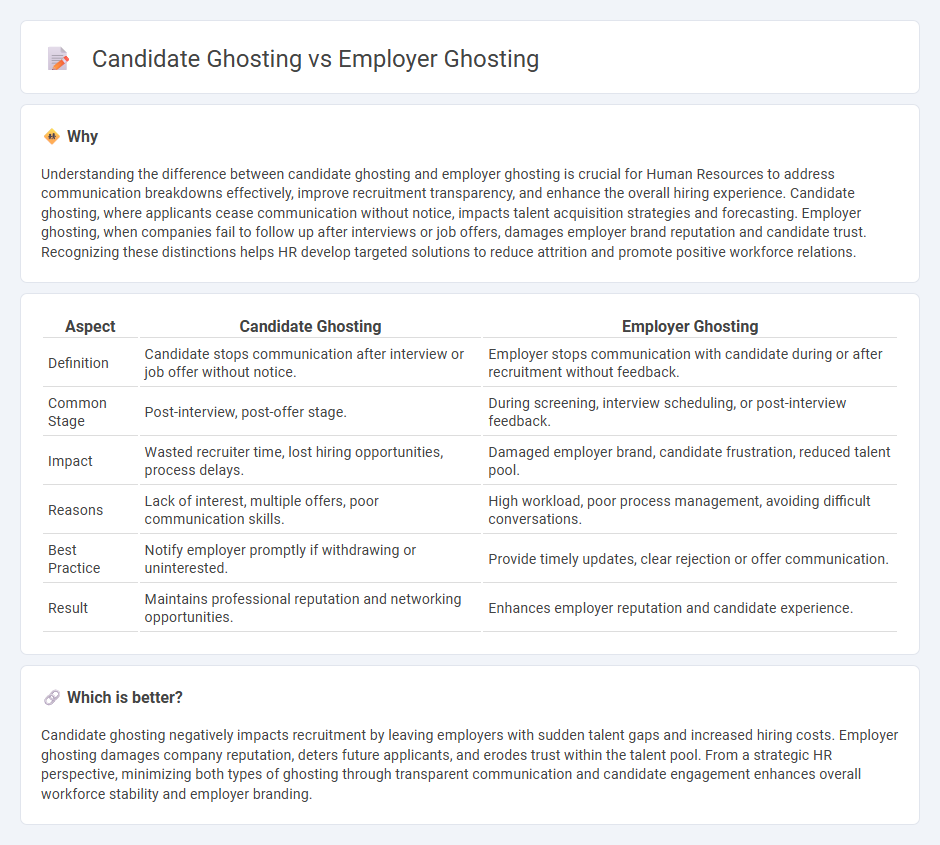
Candidate ghosting occurs when job applicants suddenly stop communicating during the recruitment process, leaving employers without feedback or updates. Employer ghosting happens when companies cease contact with candidates after interviews or job offers, causing uncertainty and frustration. Explore the implications and solutions for both forms of ghosting in Human Resources.
Why it is important
Understanding the difference between candidate ghosting and employer ghosting is crucial for Human Resources to address communication breakdowns effectively, improve recruitment transparency, and enhance the overall hiring experience. Candidate ghosting, where applicants cease communication without notice, impacts talent acquisition strategies and forecasting. Employer ghosting, when companies fail to follow up after interviews or job offers, damages employer brand reputation and candidate trust. Recognizing these distinctions helps HR develop targeted solutions to reduce attrition and promote positive workforce relations.
Comparison Table
| Aspect | Candidate Ghosting | Employer Ghosting |
|---|---|---|
| Definition | Candidate stops communication after interview or job offer without notice. | Employer stops communication with candidate during or after recruitment without feedback. |
| Common Stage | Post-interview, post-offer stage. | During screening, interview scheduling, or post-interview feedback. |
| Impact | Wasted recruiter time, lost hiring opportunities, process delays. | Damaged employer brand, candidate frustration, reduced talent pool. |
| Reasons | Lack of interest, multiple offers, poor communication skills. | High workload, poor process management, avoiding difficult conversations. |
| Best Practice | Notify employer promptly if withdrawing or uninterested. | Provide timely updates, clear rejection or offer communication. |
| Result | Maintains professional reputation and networking opportunities. | Enhances employer reputation and candidate experience. |
Which is better?
Candidate ghosting negatively impacts recruitment by leaving employers with sudden talent gaps and increased hiring costs. Employer ghosting damages company reputation, deters future applicants, and erodes trust within the talent pool. From a strategic HR perspective, minimizing both types of ghosting through transparent communication and candidate engagement enhances overall workforce stability and employer branding.
Connection
Candidate ghosting and employer ghosting are interconnected phenomena that disrupt the recruitment process and create mutual distrust. Both behaviors hinder effective communication, delay hiring decisions, and increase recruitment costs for organizations. Addressing these issues requires transparent communication strategies and fostering a respectful hiring culture to improve candidate-employer relationships.
Key Terms
Communication Breakdown
Employer ghosting occurs when hiring managers or recruiters fail to provide updates or feedback after interviews, leaving candidates uncertain about their application status. Candidate ghosting happens when applicants stop responding to communications without notice, causing delays and inefficiencies in the hiring process. Explore deeper insights into how improving communication can minimize these silent setbacks in recruitment.
Recruitment Process
Employer ghosting occurs when recruiters or hiring managers unexpectedly stop communicating with candidates during the recruitment process, leading to uncertainty and frustration. Candidate ghosting involves applicants abruptly ceasing all contact or responses after interviews or offers, disrupting hiring timelines and wasting resources. Explore effective strategies to mitigate employer and candidate ghosting to enhance your recruitment outcomes.
Employer Branding
Employer ghosting, when organizations fail to communicate with candidates after interviews or job offers, significantly damages employer branding by eroding trust and deterring top talent from future applications. Candidate ghosting, where job seekers abruptly cease communication, also impacts branding but primarily challenges the recruitment process rather than public perception. Explore deeper strategies to enhance your employer brand by addressing communication gaps effectively.
Source and External Links
3 Strong Signs an Employer Is Ghosting You | FlexJobs - Employer ghosting is when the employer stops responding to your emails, calls, or messages during the hiring process, including signs like no email replies after two weeks, always reaching voicemail, or hiring managers being constantly unavailable, signaling a lack of further interest.
How Job Seekers and Employers are Responding to Ghosting | Indeed - Ghosting can occur due to many reasons including employers moving forward with other candidates, internal hires, hiring freezes, or simple communication lapses, while candidates ghost due to lack of fit, low pay or benefits, or receiving another job offer.
Ghosting Vs. Quitting: Do I Have To Give Two Weeks Notice? | Stratus.hr - Candidate ghosting is when applicants suddenly stop communication, which can damage future job prospects and relationships, highlight the importance of professional courtesy like giving two weeks' notice to maintain good standing and avoid wage or reference issues.
 dowidth.com
dowidth.com